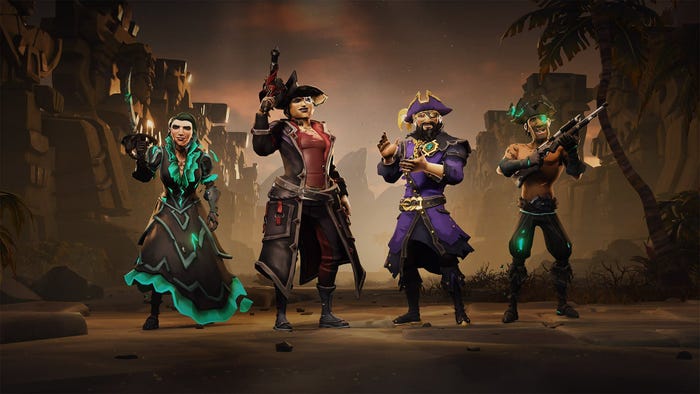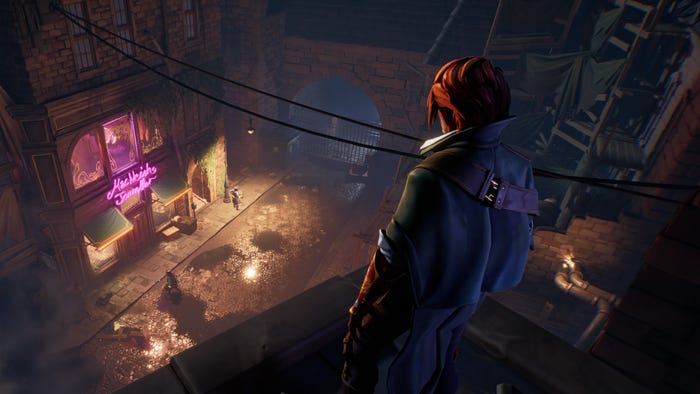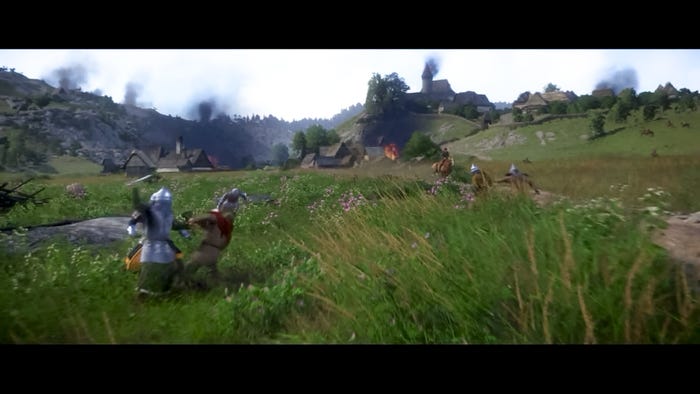
Featured Blog | This community-written post highlights the best of what the game industry has to offer. Read more like it on the Game Developer Blogs.
There are already a bunch of articles on how to get your indie game out there. In this guide I'll be getting down to the nitty gritty, explaining exactly what it is you, the budding games developer, should be providing me, the eager games journalist, with

There are already a bunch of articles on how to get your indie game out there. Kieron Gillen banged on about it. Rob Fearon put a sarcastic twist on it. Rodain Joubert 4-paged the sucker. Yet while each is giving it to the masses straight, it would appear that's just not straight enough.
I'm one of the editors at Indiegames.com, a sister site of Gamasutra and one dedicated to covering all the latest independent gaming news. I receive roughly between ten and twenty emails a day, ranging from indie press releases to reminders about games to follow-ups on past correspondence. The misconception that gaming sites won't want to cover your game because it's 'not important enough' is slowly being lifted, and independent developers in general are beginning to realize that PR is actually a huge factor in selling your product.
This, however, doesn't mean that developers are marketing their games correctly. I receive a good number of emails a day which, quite frankly, go straight in the virtual bin, bouncing off the rim in the process. It's all well and good throwing me some information regarding your latest venture, but there are right ways to go about it, and then there are not-so-right ways. Which got me thinking - while all the previously mentioned guides do a great job of pointing developers in the right direction, none of them really get right down to the nitty gritty and just simply spell it out.
Hence! Nitty gritty time it is. In this guide, I'll be explaining exactly what it is you, the budding games developer, should be providing me, the eager games journalist, with. Before I start, however, please be very much aware that certain aspects of this are going to be personal preference. Clearly I cannot vouch for the entire games journalism industry, however I do believe that following these rules will at least give you a basis for which to build on. And if all else fails, at least you'll know how to contact IndieGames.com in future!
1: The essentials
Before you even begin to think about spreading your news, there are certain bases you need covered. The following may sound painfully obvious to some, yet I still constantly come across developers who haven't laid the foundations properly. Said foundations are:
A website - either a developer site containing all your projects in one place, or a dedicated site for a single game. Regarding whether or not it's worth purchasing a real .com address or simply opting for a Blogger or Wordpress, my advice is get the .com. It costs $15 a year and gives your outfit a sense of professionalism. Of course, you can then go ahead and link a Wordpress blog to it.
A development blog - having a place where I can keep track of all the latest work on your title makes all the difference. Provide screenshots, WIP videos, insights - it's all good. Just make sure it has a working RSS feed!
A trailer - once your game is good to go, you need a quality trailer to show it off in motion. If you think you have the skills to do this yourself, by all means go ahead. Just please, for the sake of everyone, follow these simple guidelines:
a. Do not accompany the action with generic dance/house/metal/screech music. Find something which creates a satisfying atmosphere for what the viewee is witnessing. You may even want to find someone to create an original soundtrack for your trailer. For example, if 8-bit sound and chiptune is your port of call, the 8-bit Collective community are more than willing to help out games developers.
b. Do not spam the trailer with inane titles and movie-style narration. I'm watching your trailer to see the game, not a story about 'ONE MAN, ONE MISSION, THOSE HE LOVES ALWAYS LEAVE HIM'.
c. Give it some style. Don't just record yourself running around one room in the game for three minutes - that is bound to be incredibly boring. Show off the game's best features, best puzzles, best effects.
d. Do not make it too long (or too short, for that matter). My personal attention span begins to wane around the two minute mark, so you may want to aim round about there.
(Optional) A Twitter account - this one isn't exactly an essential, but it definitely can't hurt matters. Many indie developers have taken to announcing big news about their various games on Twitter even before posting to their website, and Twitter has really come into its own as the source of independent gaming news over the last six months.
2: Locate your points of attack
It's time to storm the media battlefield. There are a plethora of sites out there that cover indie games, including the likes of:
RockPaperShotgun
IndieGames
TIGSource
Play This Thing
Pixel Prospector
XNPlay (for Xbox Live Indie Games)
Your best plan of attack? Be prepared to contact everyone. If your game really is 'all that', then someone is bound to bite, right?
3: Write the email
Many developers get to this hurdle and end up with their face in the mud. Writing a good email is the most tricky aspect of marketing your indie game. It's a minefield, and you will most definitely trip some of those explosives. Hopefully, however, you can also cause some good explosions.
This is the part at which I have to humbly remind you again - what I'm about to detail is, to my knowledge, personal preference. I'm going to give it to you straight regarding the format of your press release, and what I would like to receive. This may or may not be what, say, John Walker at RockPaperShotgun wants, or Derek Yu at TIG deems suitable reading. Yet I'm going to go out on a limb and state that it really can't be that far from what others expect.
Let's get started.
a. The subject line - Make this plain and simple, containing exactly what I need to know. You can go for 'New Indie Game: MyGame' or 'Indie Game Submission: MyGame' or 'MyGame: a physics-based puzzler'. Do NOT, however, use lines like 'FOR IMMEDIATE RELEASE: AN INCREDIBLE NEW INDIE GAMING EXPERIENCE' or 'Badass Entertainment Press Release: MyGame Is Here'. You are not a robot, stop acting like one.
b. Say hi - some may say it's not essential, but I beg to differ. If I open up an email and it begins with 'Yada Interactive have teamed up with Blabla to bring you a gaming experience...', I'm immediately put off. Yet, if a message begins with a friendly 'Hey Mike, my name is Name Here and I just recently released MyGame', I'm much more likely to take an interest. Again, be a real human being!
c. Say your piece - now that you've got the reader's attention, tell them what it is you came to say quickly and to the point. There are a number of different methods that work for me. Some send a single paragraph which simply explains the point of the game. Others opt for writing a few paragraphs and going into a little more details. Both are perfectly reasonable as long as you explain exactly what kind of game you're promoting, what the general idea behind the experience is and how exactly I can go about playing it, be it a link to a flash game or an Xbox redeem code. When it comes to the question 'Should I ask whether they'd like to receive my game or just send it straight away?', a quote from Rob Fearon will do nicely here: 'Don't hold off on review copies. Don't ask "would you like one?" just bloody send it.'
d. Plant your links - it sounds so simple, but you'd be surprised by the number of developers who don't provide links to their games in promotional emails. The fact is, if I've read what you have to say and feel interested in exploring more, I'm going to go trigger-happy with my mouse on whatever you provide. Links to your developer/company website, the game's website, your development blog and the Xbox Marketplace page (if it's an XBLIG/XBLA title) are all essentials. Of course, it goes without saying that you should make sure that all links are relevant!
e. Video and screenshots - as a general rule, I would always go with embedded images over attached. It means the reader definitely sees them, and also adds a little colour to the email. Another 'well duh' moment, but make sure all screenies are hi-res! Regarding your trailer, make sure you provide a link to either a page containing your video, or a direct link to it on Youtube/Vimeo etc.
Just to make this even easier to understand, I'm now going to use the above guidelines to create a mock email. Let's say my name is Hank Scorpio, and I've created a game called 'Be the Villain' under the developer name Globex. My email may go something like this:
From: [email protected]
To: [email protected]
Subject: Indie Game Submission: Be the Villain
Hey Tim and Mike,
my name is Hank Scorpio and I create independent games under the name Globex. I've just released my latest indie title and I'd love if you'd check it out and consider featuring it on the IndieGames Blog.
The game is called 'Be the Villain' and it's a spy vs spy real time strategy. Featuring a single player campaign with over 50 missions, it's set in a world similar to that of James Bond, but with a twist - for you control the enemy, plotting to take over the world! The game is solely developed by myself, and features a full musical score and a unique 16-bit graphical style.
A trailer can be found via Youtube here. If you're interested, the game can be found on my website under the Games tab.
Thanks for your time and I look forward to hearing from you!
Hank Scorpio
Globex
Simple, no?
4: Don't give up, but don't be a broken record either
So you've sent your email off to various sites, and after a week no-one has responded. Clearly they all hate your game, right? Unfortunately, your game may be well worth promoting, but for reasons unknown to you, the recipients just didn't spend the time checking it out enough. That's right - you may have done absolutely nothing wrong whatsoever, yet you've STILL been given the cold shoulder.
The problem is this - real life. Everyone is part of it. Sometimes it makes you happy, and other times not so. The truth is that the reader's mood has quite a part in determining whether or not they'll receive your gaming news in good spirits or not. Catch them on a good day, and they may just want to take your game and put it on their site. Contact them while they're hungover, feeling irritated or just in a general bad mood and your chances become more slim. It's a horrible fact, and one which is completely out of your control. Or is it?
The key is to brush yourself off and give it one more try. Don't just resend the original email again, though. Rewrite it ever so slightly, change the subject line, then power it back out there. Maybe, just maybe, this time someone will be feeling good about life and give you a look-in.
Of course, if you hear nothing back a second time, it's probably fair to say that people simply are not interested. At this point you're going to need different assistance. Good luck with that.
Hopefully this guide has given you ideas on how to propel your project into the limelight. A final note - never be disheartened. Assuming you're making games because it's a passion of yours, it really shouldn't matter to you whether your game is received with praise or not, as long as you're creating exactly what you want to create. After all, that's the point of being 'indie', right?
Read more about:
Featured BlogsAbout the Author(s)
You May Also Like









